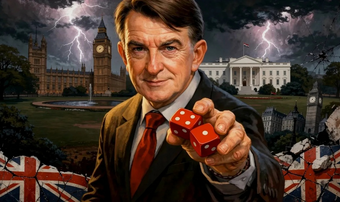What next for the Conservative Party?

If you’re a regular reader of these blogs, you’ll notice that we haven’t spent as much time writing about the Conservatives recently; this is largely just reflective of the new reality we find ourselves in, with Labour all set to call the shots for the next five years (barring something truly extraordinary). To state the obvious, it matters rather more what the Cabinet do, than what the Shadow Cabinet do.
And with the parliamentary arithmetic so stacked against the Conservatives, after their historic wipeout in the July election, their influence is dimmed far below that of other Official Oppositions in recent years; backbench rebellions will be less consequential than, say, when Parliament rejected Theresa May’s multiple attempts to pass a Brexit deal.
That doesn’t mean that they are unimportant; far from it. In addition to all the good which can be done in the regular life of an MP - from constituency casework to Select Committees and APPGs - within what has been, until now, essentially a two-party system, the Tories have always had the opportunity to respond in the next election. It is rare that - bar in the occasional opinion poll, such as after the defection of the Gang of Four in the 80s, or in the height of Cleggmania in 2010 - either Labour or the Tories are seriously threatened.
But after the pasting they received back in July, the Conservative Party is now facing more existential dilemmas than it has done for a while. Having lost voters to all sides - not just to Reform - any new leader will have to simultaneously defuse the threat of Nigel Farage, win back the voters who defected to the more ‘moderate’ Lib Dems or to Labour, and to motivate all those who stayed at home altogether to return to the ballot box. In short, not an easy task…
And, fascinatingly, the task at hand feels perhaps more pressing now than it did three months ago. With Labour’s majority being as big as it was - the third largest in British history, excluding National Governments - all the talk had been of them being in office for at least a decade (as indeed, it had been when Boris Johnson won his majority in 2019).
Yet 100 days in, Labour is floundering. The donations scandal. Cutting the Winter Fuel Allowance. Sue Gray being forced out. ‘Two-tier Keir’...or should it be ‘Free gear Keir’? You’d be forgiven for wondering what the difference was with the previous administration.
And the public have well and truly noticed. Stephen Fry, an erstwhile Labour man, was damning this week in his description of their start in Government on LBC: “Disastrous, disastrous. I mean, it does seem extraordinary, doesn't it, because you think you're in opposition, you've got a bit of time to get things together…It is a mystery that they could have allowed themselves to get into this mess.”
The polls are stark. 59% of Brits disapprove of Labour’s record in Government so far. Just 18% think they’re doing a good job. 39% of Brits think the country has got worse so far (just 9% say it has got better). Keir Starmer’s personal popularity ratings have sunk to -36. In some polls, the Labour lead over the Conservatives, which earlier in the year stood at more than 20 points, has shrunk to just 1 point. The Conservatives had obsessed over how to close the gap. It turns out all they needed was for Labour to have a go in charge…
And so the Conservatives do matter again. Because rather than thinking Labour will be in power for a generation, some commentators are starting to whisper what felt unthinkable just a few weeks ago…that this iteration of the Labour Party may only have one term in Government after all.
In the midst of this, the Conservatives have been doing some soul-searching amid a highly drawn-out leadership contest. It began with six, who the current MPs had to vote on anonymously; and like in a political version of the Weakest Link, we’ve been losing one contestant per round until now. At the start of this week, four candidates remained: James Cleverley, Kemi Badenoch, Robert Jenrick and Tom Tugendhat. Tugendhat fell on Tuesday, as expected.
But the shock came on Wednesday, when in typical Tory cloak-and-dagger fashion, James Cleverley, who had had comfortably the most votes (39) in the previous round, somehow lost supporters (37), and was pipped by Badenoch (42) and Jenrick (41). At this point - I kid you not - I let out an audible gasp in the Comms office.
What had happened? Had Cleverley looked to engineer a leadership contest against the candidate he wanted, and lent too many votes to one of the other candidates by mistake? Had they just been lulling him into a false sense of security? Had Cleverley’s complacency in spending the final night at the pub rather than canvassing votes cost him? Westminster was awash with rumours, all highly entertaining, and all utterly based on speculation. The Conservatives’ reputation for secret shenanigans certainly shows no sign of disappearing.
But to more serious matters. However we got here, the choice will now be between Kemi Badenoch and Robert Jenrick to become the leader of His Majesty’s Opposition. The results of the vote, which is now thrown open to the Conservative membership, will be announced on 2nd November.
Both figures are perceived as being on the right of the party: Badenoch has acted as Secretary of State for Business and Trade, and as Minister for Women and Equalities, and has attracted attention for her robust views on things like race and gender.
Jenrick’s journey to his current position has been more roundabout, having initially been installed as Minister for Immigration as an ally to Rishi Sunak, before handing in a shock resignation, claiming that the Rwanda Bill wouldn’t go far enough. He is already making leaving the ECHR (European Court of Human Rights) a central pledge of his campaign, saying that everyone who served in his Cabinet would have to agree to it.
CARE, as ever, is politically neutral; we look to encourage good government, and good policies, wherever they are found, and do not support any particular candidate or party. But we do look to draw out lessons from what is going on, and to provide thoughtful commentary which will help you approach matters from a Christian point of view: with that in mind, here are three things I’ve been pondering as the race to become the next Conservative leader hots up.
1. Seasons Change
The shift in the last 14 years of the Conservative Party has been marked. David Cameron’s administration was seen as a Blair-lite government. All the talk was of ‘compassionate conservatism’ and ‘hug-a-hoodie’. The Conservatives were no longer ‘The nasty party’; instead, they became an advocate for the liberal consensus on a swathe of social issues, including marriage, abortion and the environment. Ironically, this reached its zenith under the darling of the Tory right, Boris Johnson.
Seasons do change. The pendulum swings back. It feels like a long time since the days of Cameron, Osborne and May. And of course, such a situation is hardly unique to the Conservatives; Labour went from Blairism to Jeremy Corbyn, and now, seemingly, back again.
As Christians we know that the Lord “changes times and seasons; he deposes kings and raises up others” (Daniel 2:21). What it does show, however, is the merits of sticking it out, if you’re a member of a party, and frustrated at the direction the party is going in: seasons change, and eventually things come full circle.
To not see a more moderate candidate (like Cleverley or Tugendhat) proceed through to the members was a surprise; instead, we have two cut from the same cloth. We can already anticipate what the main talking points in the contest will be over the next few weeks: immigration; Europe; the culture wars; how to beat Nigel Farage. Of course, these things also appeal to the Tory Members, who tend to lean more to the right (hence why voted in Liz Truss over Rishi Sunak in 2022).
The Tory Party today is now the most right-wing of any I’ve known in my lifetime whether that is for good or for ill; or more realistically, a bit of both! Both candidates have certain policy positions which we would be pleased to see, from Badenoch’s staunch support of women’s rights in the transgender debate, or Jenrick recently coming out and saying that he had changed his mind and now opposed the introduction of Assisted Suicide.
2. The ‘shock’ factor
Both Jenrick and, in particular, Badenoch, have what we might call, ‘the shock factor’. Both regularly say things which will capture headlines, rather than being cautious with their language.
For Kemi Badenoch, this is actually a strength: she said at Conservative Party Conference last week that she was the only candidate who is “someone who is going to cut through, someone who is going to stand up to (Labour) and someone to face down Farage”.
And it’s certainly true that both candidates will do things which will get themselves noticed, if not always for the right reasons. It’s a strategy which is high-risk, high-reward.
Of course looking to provoke people isn’t necessarily a bad thing: Jesus was certainly provocative! At its best, it can be highly effective. I - perhaps controversially - didn’t see anything wrong with Badenoch raising questions around different cultures and immigration a couple of weeks ago. And, although it struck me as highly performative, when Robert Jenrick wore a t-shirt to go running saying “Hamas are terrorists”, I didn’t particularly mind that either.
At Conference, Badenoch attracted a spat of negative headlines for seeming to say that she wanted to cut maternity pay (whilst maintaining that this was not what she had actually said). Jenrick got into hot water for saying that being in the ECHR meant that British special forces don’t feel like that they can take terrorists as hostages, and that they had to kill them instead (with people suggesting that such rhetoric endangered our soldiers).
To create rows accidentally is not a virtue; and there’s only so many times you can say that you’ve been misinterpreted before it’s probably just more accurate to say that you’re just not a very clear communicator!
Instead of unnecessarily looking for a fight (I read an article recently which said that Kemi could start a fight in an empty room…perfect for the Tory Party Conference!), I come back to Paul’s words to the Romans: “If it is possible, as far as it depends on you, live at peace with everyone” (Romans 12:18).
And of course, the other aspect to all this is this: what does it say about our culture more generally, that it’s seen as a winning strategy for people to look to shock, rather than to pursue nuance…
3. We can’t keep putting off problems
Put aside, for a minute, whether Kemi Badenoch or Robert Jenrick would be up to the job of running the country, if elected.
If there is one thing which this Conservative Leadership election (and indeed, the result of the General Election) is showing, it’s this: people are fed up with the mainstream consensus.
Take immigration. Christians take (in my view, quite understandably) different positions on whether we should support high immigration levels or not. But for years, people have felt ignored by what they perceived as the Westminster elite, who did nothing as the immigration number rose year on year.
One of the most striking moments from the TV debates prior to the General Election came from Nigel Farage, who tried to pin down Penny Mordaunt on the Conservatives’ record on immigration:
‘Given that your 2010 manifesto, your 2015 manifesto and your 2017 manifesto said you would reduce net migration to tens of thousands, and your 2019 manifesto said immigration would massively reduce, and that net 4.3 million people have come into the country since that time, why on earth should anybody believe the fifth manifesto which promises cuts to net migration?’
The results, when they came, were damning: Farage’s Reform Party took 14% of the vote. In polling now, they are even higher, regularly hitting 20%. It turns out that if you essentially add enough people to fill a city the size of Birmingham every couple of years…voters might notice!
Now I (speaking personally) am no Farage fan; in fact, I am quite the opposite. I really struggle with his tone, with the company he keeps, and with the division he has fomented in recent years.
But I do think that issues like immigration have to be taken seriously. The alternative is that, by ignoring it, you end up pushing voters to take more extreme positions.
Does that mean I think Robert Jenrick or Kemi Badenoch are the people to fix things? Not necessarily. And I certainly have reservations about any candidate who is effectively a one-trick-pony, because the Bible speaks into all of life, not, just one issue! There are all kinds of issues which Britain is facing at the moment, from international threats, to an NHS desperately in need of reform, and a society which feels more divided than ever before.
But both candidates are disruptors, if nothing else; both of them would present a different challenge to Keir Starmer to what has gone before, so that the two main parties don't sound quite so similar.
These next few years might end up being rather interesting after all…






